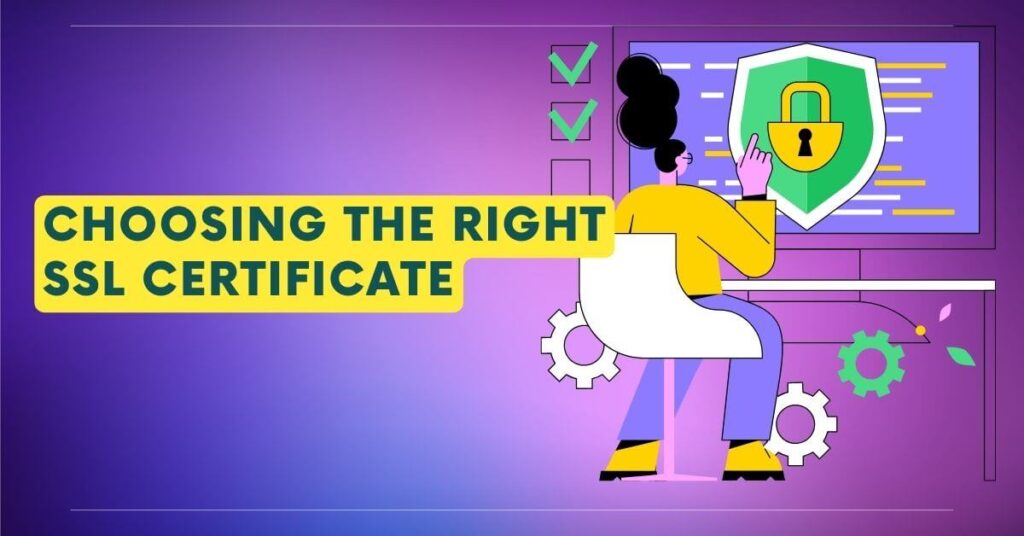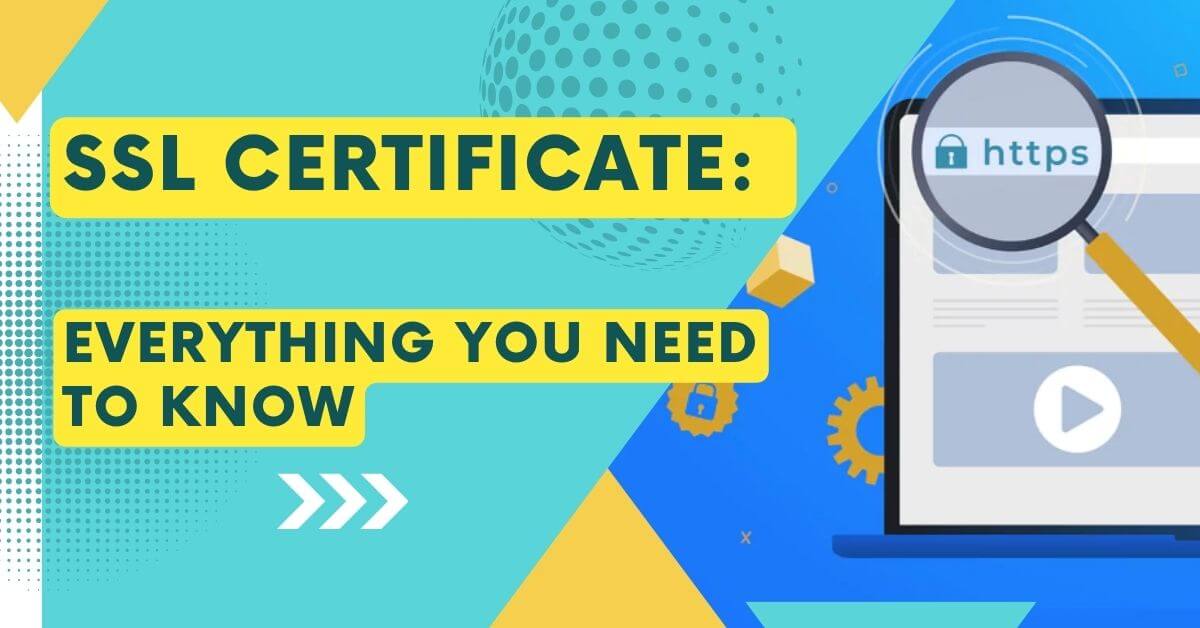Introduction
In a world where online security is paramount, SSL certificates are digital guardians protecting your online presence. But what exactly is an SSL certificate, and why should you care about it? Whether running an e-commerce application or a personal blog, this article will demystify SSL certificates and guide you through secure web browsing.
How SSL Works
SSL, which stands for Secure Sockets Layer, is a crucial technology that ensures data sent between a user’s browser and a web server remains private and secure. This digital bodyguard uses encryption and decryption to shield your sensitive information from prying eyes. Consider it an impenetrable fortress around your data, keeping it secure from hackers and malicious actors.
The SSL handshake process, often unseen by the end user, plays a pivotal role. It’s the virtual “secret handshake” between your browser and the server, establishing a secure connection. When you see “https://” and a padlock icon in your browser’s address bar, SSL at work indicates a safe environment for online interactions.
Benefits of SSL Certificates
So, why should you bother with SSL certificates for your website?
- Data Security: SSL ensures that data transferred between your website and visitors is encrypted, making it closely impossible for hackers to intercept and decode.
- Improved SEO Ranking: Google loves websites that prioritize security. With an SSL certificate, your site will likely rank higher in search engine results pages.
- Enhanced User Trust: When visitors see that reassuring padlock icon, they’re more likely to trust your website, enter their information, and engage with your content.
- Regulatory Compliance: For e-commerce websites, SSL certificates are often mandatory for regulatory compliance, particularly regarding payment card industry (PCI) data security standards.
Different Types of SSL Certificates
SSL certificates come in various flavours. Let’s explore the options:
- Domain Validated (DV) Certificates: These essential SSL certificates verify only domain ownership. They’re suitable for personal blogs and small websites.
- Organization Validated (OV) Certificates: OV certificates verify domain ownership and some additional information about the website owner. Businesses and organizations often use them.
- Extended Validation (EV) Certificates: EV certificates provide the highest level of trust. They require a rigorous validation process, turning the browser’s address bar green and displaying the organization’s name, offering the utmost assurance to visitors.
- Wildcard Certificates: These certificates secure the primary domain and all its subdomains. Ideal for websites with multiple subdomains.
- Multi-Domain (SAN) Certificates: SAN certificates, or Subject Alternative Name certificates, can secure multiple domain names with a single certificate.
Choosing a suitable SSL certificate depends on your website’s nature and specific security needs.
Choosing the Right SSL Certificate

When choosing the proper SSL certificate, several factors come into play. It’s essential to match the certificate type to your website’s needs. Here’s how to go about it:
Factors to Consider:
- Website Type: Consider whether you’re running a personal blog, an e-commerce site, or an organization’s website. The level of trust you need depends on your site’s purpose.
- Budget: SSL certificates come in a range of prices. Determine your budget and find the best certificate that fits within it.
- Validation Level: Think about the level of validation you want. For an e-commerce site, an EV certificate might be the best choice, but a personal blog may only need a DV certificate.
- Wildcard or SAN: If your website has multiple subdomains or domain names, consider a wildcard or SAN certificate for convenience and cost-effectiveness.
Where to Buy SSL Certificates: After deciding on a suitable certificate for your website, it’s time to acquire one. Several certificate authorities (CAs) offer SSL certificates. Popular options include DigiCert, Comodo, GoDaddy, and GlobalSign. Compare features, cost and customer reviews to find a reputable CA that meets your needs.
Installing an SSL Certificate
Once you have your SSL certificate, install it on your web server. The installation process can vary depending with your hosting environment. Here’s a general overview:
Obtaining the Certificate:
- Typically, your CA will provide you with the SSL certificate files. These files usually include the certificate itself, an intermediate certificate, and a private key.
Installing on Different Servers:
- On an Apache server: Configure the SSL module with the certificate and private key.
- On an Nginx server: Configure the SSL certificate and key in the server block of your Nginx configuration file.
- On Windows Server: Import the SSL certificate through the Certificate MMC.
Testing the SSL Installation: After installation, it’s crucial to test your SSL configuration to ensure it’s working correctly. Online tools like SSL Labs’ SSL Server Test can help you verify the security of your site and identify any issues.
Renewing and Reissuing SSL Certificates
SSL certificates have a limited lifespan, usually one to three years. To maintain your website’s security, renew your SSL certificate before it expires. The renewal process involves obtaining a new certificate from your CA and installing it.
In some cases, you might need to reissue your SSL certificate. This could be due to lost private keys, changes in your website’s domain, or other unforeseen circumstances. The reissuing process typically requires you to validate ownership of the Domain name again.
SSL and E-commerce
For e-commerce websites, the use of SSL certificates is non-negotiable. Security is paramount when dealing on sensitive customer information and payment data. SSL ensures that data transfers between your customers and your website remain encrypted, reducing the risk of data breaches.
Moreover, SSL certificates are often required for regulatory compliance, such as PCI DSS (Payment Card Industry Data Security Standard). Compliance with these standards is essential for maintaining customer trust and avoiding potential legal consequences.
SSL and SEO
Search engines like Google give preference to secure websites. In 2014, Google announced that HTTPS would be a ranking factor. This means having an SSL certificate and enabling HTTPS can positively impact your search engine ranking. Search engines consider Sites with SSL certificates more trustworthy, making them more likely to appear higher in search results.
SSL and Browser Compatibility
While SSL is a universally recognized security standard, not all browsers interpret SSL certificates similarly. Some older browsers may not support the latest encryption methods, potentially leading to compatibility issues. Ensuring your SSL certificate is compatible with the most commonly used browsers and their various versions is essential.
The padlock-icon in the browser’s address bar indicates a secure connection, instilling confidence in your visitors. However, users of older browsers may not see the padlock, so it’s crucial to balance security with accessibility.
Mixed Content Issues
Mixed content issues can crop up when you transition your site to HTTPS. Diverse content occurs when a secure HTTPS page loads resources (like images, stylesheets, or scripts) over an insecure HTTP connection. This creates a security risk because an attacker could manipulate these resources.
To resolve mixed content issues, you must use HTTPS to identify and update any HTTP resource links on your website. This ensures that all resources are loaded securely and the padlock icon appears consistently in all browsers.
SSL and Mobile Compatibility
With the increasing use of mobile devices for web browsing, ensuring your website is mobile-compatible and secure is crucial. Mobile users are just as concerned about their data security as desktop users.
For mobile apps, SSL is equally vital. When transmitting data between a mobile app and a server, using secure connections to protect sensitive information is imperative. Implementing SSL in mobile apps is essential for building trust with your app’s users.
SSL and Email Security
SSL isn’t limited to securing your website; it’s also used for securing email communications. With the rise of email-based threats and cyberattacks, it’s essential to encrypt email data in transit.
Setting up SSL for email servers ensures that your email communications remain private. Modern email clients and servers support SSL/TLS for secure email transmission. Implementing SSL for email servers is a proactive step towards enhancing your organization’s email security.
EV SSL Certificates and Identity Verification
Extended Validation (EV) SSL certificates provide the highest level of trust and security. These certificates require a rigorous validation process that goes beyond domain ownership verification. The result is a green address bar in the visitor’s browser, displaying the organization’s name prominently.
Visitors who see the green address bar know they’re on a highly secure website, reducing the chances of phishing attacks. EV SSL certificates are often used by financial institutions, e-commerce giants, and government websites.
Wildcard and Multi-Domain SSL Certificates
For websites with complex structures and multiple subdomains or domain names, wildcard and multi-domain SSL certificates offer practical solutions:
- Wildcard Certificates: These certificates secure the primary domain and all its subdomains. A wildcard certificate save your time and money if you have a website with numerous subdomains. One certificate covers them all.
- Multi-Domain (SAN) Certificates: Also known as Subject Alternative Name certificates, SAN certificates can secure multiple domain names with a single certificate. A SAN certificate simplifies the security process if you manage several domains under one roof.
SSL Renewal and Revocation
SSL certificates have a limited lifespan to ensure ongoing security. You must renew your certificate before expires to prevent disruptions to your site’s secure connection. The renewal process typically involves obtaining a new certificate and installing it, replacing the expiring one.
In some cases, you may need to revoke an SSL certificate. Reasons for revocation might include:
- A compromised private key.
- A change in your organization’s name.
- The sale of your website.
Revocation is essential to maintain the trust and security of your website, preventing unauthorized access.
SSL and Web Hosting
When it comes to hosting your website, whether on a shared hosting platform, dedicated server, or cloud hosting, SSL is vital in securing your data in transit. The process of installing SSL certificates can vary depending on your hosting environment.
- SSL on Shared Hosting: Shared hosting providers often offer SSL certificate options. The installation process may be managed through the hosting control panel.
- SSL on Dedicated Servers: You have more control over SSL certificate installation on dedicated servers. You can choose the certificate authority and manage the entire process.
- SSL on Cloud Hosting: Many cloud hosting providers offer integrated SSL certificate management solutions, making securing your website more accessible.
SSL Best Practices
As you journey through the world of SSL certificates, it’s essential to follow best practices to ensure maximum security:
- Regularly Updating SSL Certificates: Keep an eye on your certificate’s expiration date and renew it well in advance to prevent any lapses in security.
- Implementing HSTS (HTTP Strict Transport Security): HSTS is an HTTP header that forces web browsers to communicate with your server using secure connections, further enhancing security.
- Content Security Policies (CSP): Implement CSP headers to control where resources are loaded from on your site. This helps to prevent cross-site scripting attacks and enhances your site’s security.
Future Trends in SSL
The world of web security is constantly evolving, and SSL is no exception. Here are some trends to watch for in the future:
- Post-Quantum Cryptography: As quantum computing advances, SSL certificates must adapt to new encryption methods that can withstand quantum attacks.
- SSL 3.0 and TLS 1.0 Deprecation: Older SSL and TLS protocols are becoming deprecated due to security vulnerabilities. Websites will need to migrate to more secure versions.
- Improved Security Protocols: New security protocols will continue to emerge, providing even more robust protection for online data.
Conclusion
In a world where online security is paramount, SSL certificates are the knights in shining armour, safeguarding your website and its visitors. As cyber threats evolve, SSL remains a cornerstone of online security, offering data protection and trust-building for users.
Securing your website with an SSL certificate isn’t just a matter of compliance or SEO ranking; it’s a fundamental step in building trust with your audience. When visitors see that padlock icon in their browser’s address bar, they know their data is in safe hands, and that’s a valuable reassurance in today’s digital landscape.
So, take the plunge, embrace SSL, and secure your website. Whether you’re a blogger, a business owner, or an online entrepreneur, it’s an investment in the security and trustworthiness of your online presence. SSL will remain a beacon of safety and trust for all web users as the digital world evolves.
And with that, you’re now equipped with a comprehensive understanding of SSL certificates and their pivotal role in securing the web. Keep going; implement SSL and make your internet corner a safer and more trusted place for all.
Remember, there’s no such thing as being too safe when it comes to online security. Embrace SSL, protect your website, and instil trust in your users. Happy browsing, and may your online journey be secure and prosperous!




